Muslim Marriage Crisis: A Photo Series Exploring the Reality for Muslim Women
by Nailah Dean in Culture & Lifestyle on 5th October, 2022
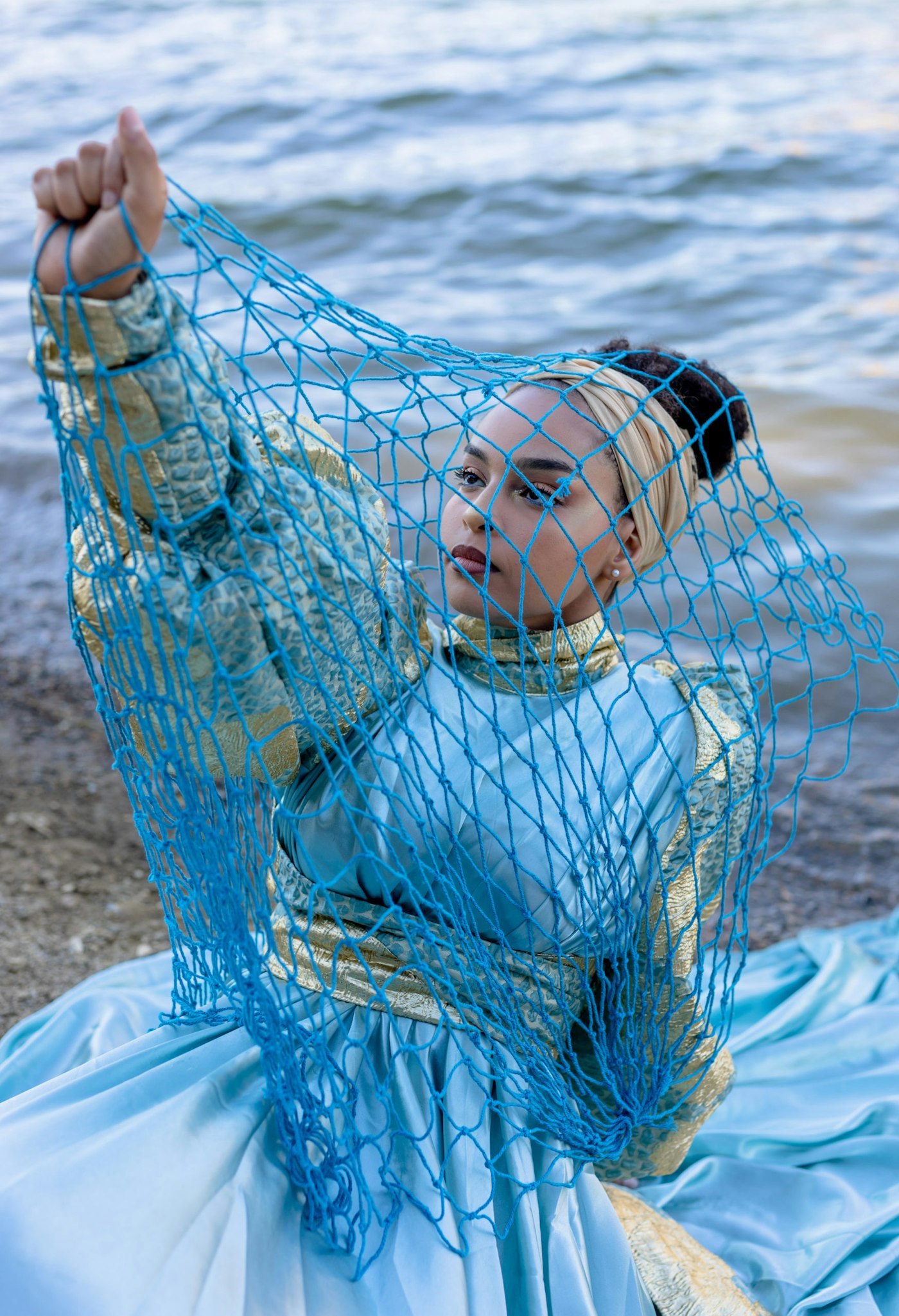
The Isms Project by Nailah Dean is a photo series documenting the Muslim Marriage Crisis from the perspective of Muslim Women. It looks at being divorced, sizeism and ableism.
As a Muslim woman, finding a practicing Muslim man has been difficult. After a few years of floundering, swiping left and right on matrimonial apps, and having no luck with matchmakers, I went on a journey to answer the question: why is it so hard for educated, practicing Muslim women, over the age of 25, to get married? I began interviewing women informally and formally about their struggles to find the one and landed on a handful of unspoken reasons. I came to understand that the Muslim community, particularly in the U.S, is experiencing a marriage crisis.
What is a marriage crisis?
On the one hand, Muslims who have never been in a relationship before, and have been ill-equipped with premarital education are entering into marriage at a young age, and getting divorced. Abusive relationships are swept under the rug, and divorcees (particularly women) find it challenging to get re-married. While our divorce rate continues to increase, the more concerning trend is the number of never married, single Muslims. Whether it is due to practical matters like a desire to delay marriage due to finances or careers, or an inability to simply meet and mingle with Muslims of the opposite sex, young Muslims are having a hard time getting married. My investigation into these matters showed me that there were stigmas or prejudices that are preventing Muslims from getting married.
The Isms Project Photo Series:
The Isms Project was born from a realization that “isms,” like ageism, sexism and racism are perpetuating a marriage crisis in the Muslim community. After writing about my experiences, and those of the women around me on various online magazines and blogs, I came up with an idea for a photo series. I wanted to document and share the stories I was collecting in a more visual manner. So in early 2021, I gathered a team of Muslim female creatives and planned an epic photo shoot set in Northern California. Together we told the stories of women who were battling prejudices to find love and marriage, while also finding the inspiration to stay resilient and confident as they continue their hunt.
After a lot of positive feedback and media attention, we came back for part two– the Isms Project 2.0. This year, we took on new “isms”– the stigma of divorce, sizeism and ableism. The photos depict two versions of the women: one photo depicts her battle with the ism, and the second symbolizes her freedom from it. I wanted the dual photos to present the problem, and not necessarily the resolution, but the defiance of the Muslim woman who continues to seek love and marriage despite the ism(s) that challenge and deter her.
STIGMA OF DIVORCE
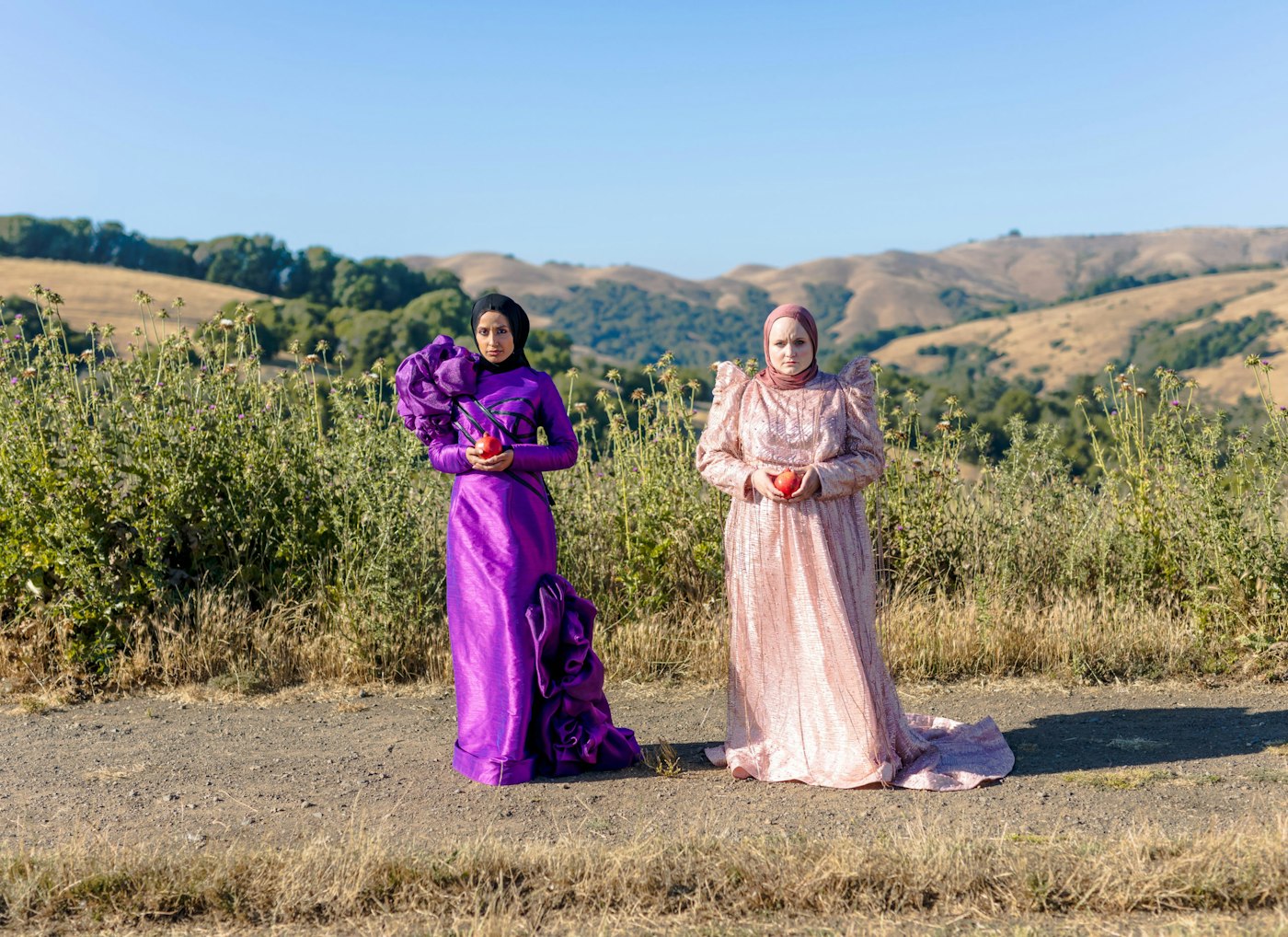
“To be divorced, female, and Muslim is the ultimate scarlet letter. In our community, potential suitors see us as leftovers, mere damaged goods. There were fruits that we cultivated in our first marriage; growth spurts, milestones met, children born and faith deepened. Fruits, not burdens. And yet, these fruits are used against us.”
When I was thirteen years old, I received earth shattering news that my parents were getting divorced. Like most teenagers, I was already going through lots of emotional and physical changes. Yet, that bit of news really turned my world upside down. Although I understood it was best for our family at the time, it was a difficult period of instability. To make matters worse, the community we were part of, didn’t provide much support. In fact, sharing the news amongst my friends in Sunday School felt shameful because divorce was seen as something haram. It wasn’t until I got much older, that I learned where divorce stands in the Islamic jurisprudence—permissible, but not encouraged.
That feeling of shame was something I heard again and again when I began to speak to women who were divorced and seeking love again. It wasn’t their shame they were carrying, but rather the feelings of shame worn by their family or those in the community.
Due to cultural beliefs, not Islamic tradition, there is a burning stigma associated with divorce for Muslim women.
To highlight the impact of this stigma, we found two women to be our models to represent “divorce-ism.”
Both women experienced divorce and had done the work to heal, and felt that the stigma created a barrier for them to get re-married. The shoot took place in farmland in Bolinas, California. The rolling hills, tall grasses and cows roaming around in the background helped tell the tale of the woman who has lived a full life. I wanted the setting to speak to how a woman who is seeking love for a second time has already done so much work. She has survived the difficulties that come with cultivating a marriage. Just as a farmer plants seeds and does the work to harvest in the spring, a divorcee ready for marriage again has done the work she needs to enter into a new relationship.
In the “ism photo,” the women hold pomegranates. These represent the fruits that were grown in their first marriage. Women are so often represented in art holding apples to symbolize the Creation story of Adam & Eve. However, I replaced it with a pomegranate to symbolize love and fertility. The love they hold isn’t the love from their first marriage, but the love they have shown themselves in their healing process, and the love they hold for someone new. I also wanted the fruit to be representative of children who are the fruits of any woman’s first marriage.
In the second photo, the female empowerment photo, I have the two women looking at each other without the “ism” prop. I wanted to showcase the sisterhood that many women find after divorce when they are able to find those who have traversed similar difficulties. There is strength that develops in their bond and in the reliance upon one another.
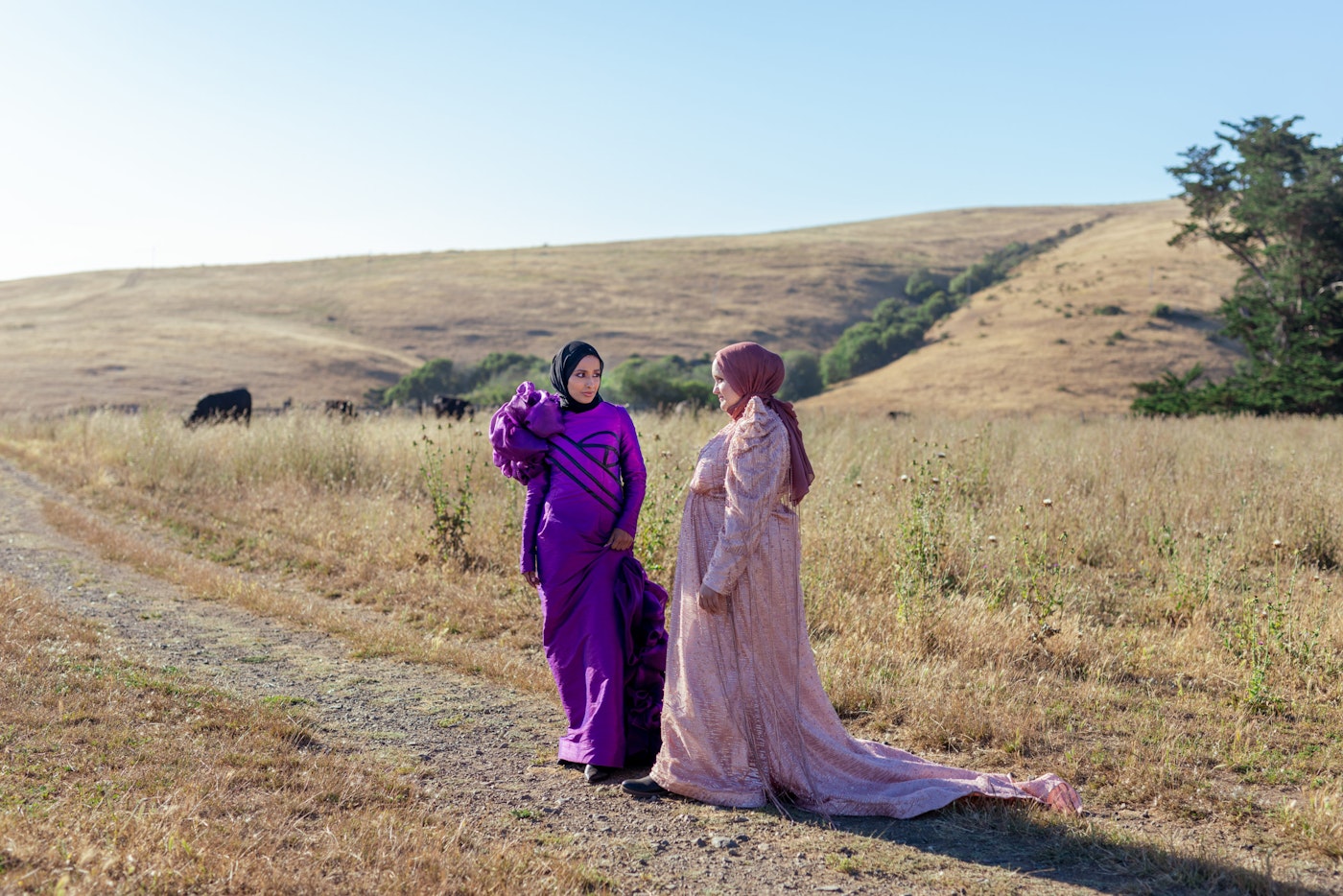
“The end of a marriage doesn’t signify our worth. With tawakal, we know that whatever Allah has written for us, whether it be marriage or a new life’s purpose, we will rise above the challenges and achieve all we aim to be.”
SIZEISM
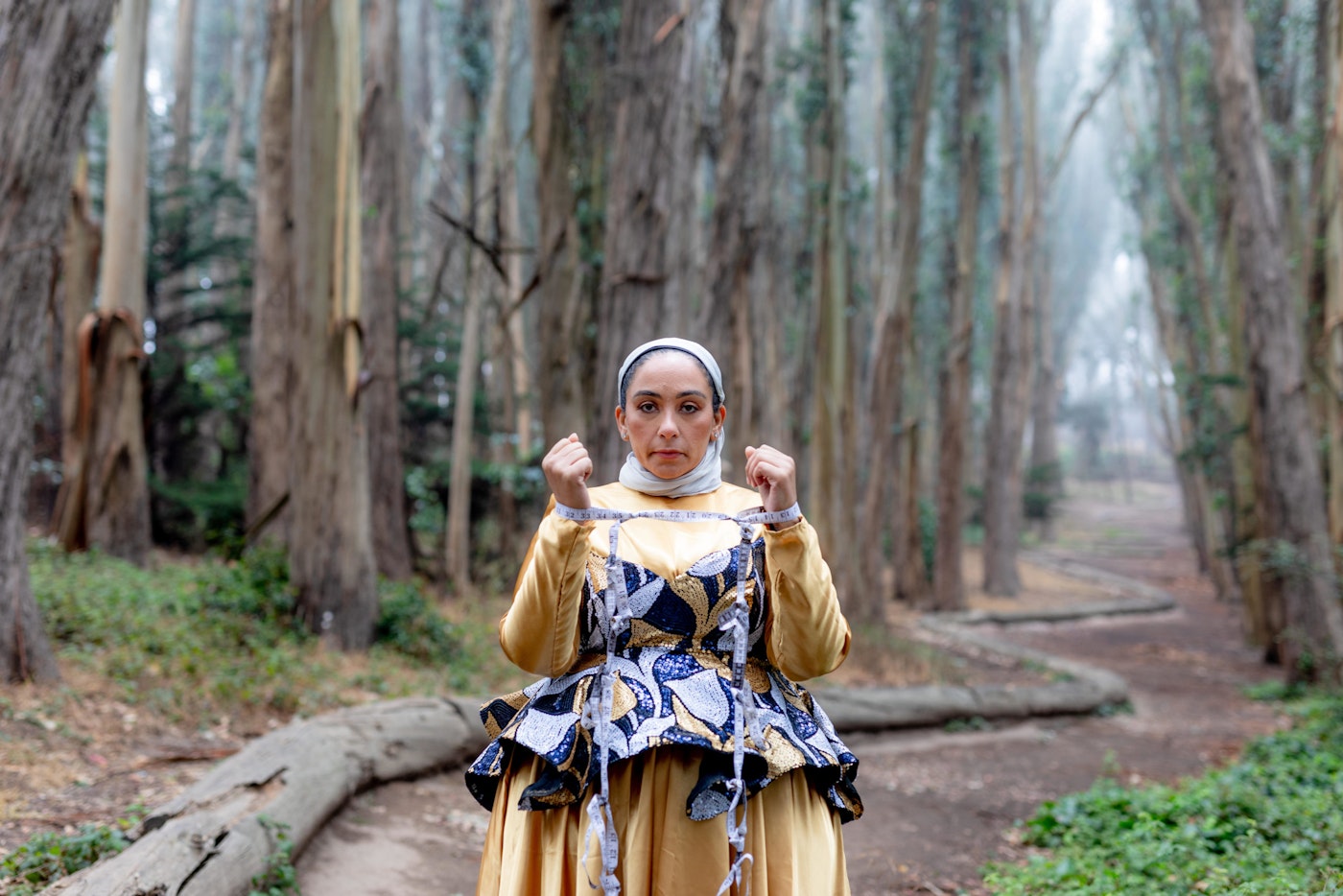
34 years old, Egyptian American, middle-school educator from Minnesota
“Ever since I can remember, I’ve been self-conscious about my weight. The commentary wasn’t always direct. Sometimes it was a stare if I took an extra helping of dinner, or a referral to a new gym. I always knew what they wanted to say– lose weight. Yet, it didn’t really impact my day-to-day until I started looking for a spouse. I would go on dates with these guys from the apps, and they would say, you’ve got a pretty face, but I just don’t want to end up with a big girl. Aren’t I more than just my body?” – A.A
Throughout history, beauty standards have changed. A love for voluptuous hips morphed into an obsession with thin-rail bodies. Now, trends on Tik Tok and medical procedures have women dying to change their lips, breasts, butts– everything. Maybe it’s not always in the aims of getting a man, but the desire to adapt one’s body to meet the satisfaction of society’s standards, is there.
We wanted to start a conversation around a woman’s size, and the importance that plays in her ability to get matches. The dictionary definition for sizeism is “prejudice or discrimination on the grounds of a person’s size or weight.”
When I interviewed Muslim women about this topic, I heard similar stories: parents who put their young girls on weight loss diets, matchmakers who chided them about their size, and men who said that her pretty face didn’t make up for “big body.” Different women, from different ethnic communities, but the same stories. If a woman is anything, but thin, she’s at the bottom of the pool for marriage. Such behavior is contradictory to Islamic teachings that emphasize a focus on religiosity and character over physical appearance.
Living in a world where filtered and photoshopped photos dominate our social media, we must fight the pressure to judge and choose one another solely based on appearances. While beauty and physical attraction are prophetic considerations for marriage, there’s a need to interrogate our current standards that result in harmful communal behavior and fewer successful marriages. Speaking out about the body shaming that exists in our community is just one example of how we can begin to challenge society’s ever-changing beauty standards.
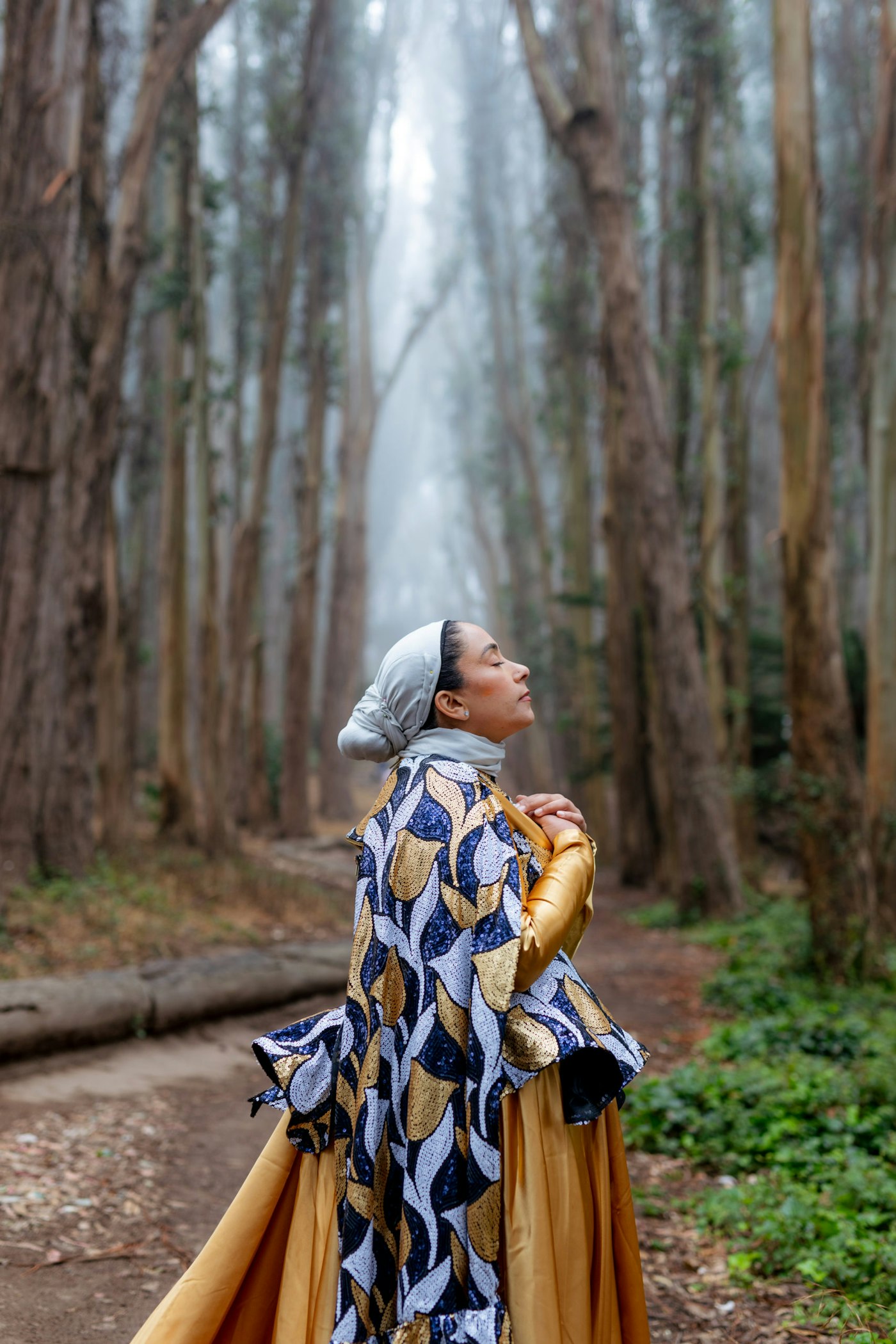
“It took a few years to work through the hurt– that sting that came from the body shaming and rejection. When I deepened the practice of my faith, and began to love myself just as God created me, I found peace. I now know I am more than a number on a scale. I am more than just my body. And inshaAllah the right man will know this too.” – A.A
ABLEISM
 33 years old, Pakistani American Scientist from Massachusetts
33 years old, Pakistani American Scientist from Massachusetts
“I was born hard of hearing. I wore a hearing aid up until my mid-twenties when I received cochlear implants. That changed my life. Before that it was really hard navigating the Muslim community, Sunday School and Friday khutbas, because they didn’t always factor in inclusivity and accessibility. Now, as I search for love and marriage, I’m feeling it again–the otherness. Be it matchmakers or men I meet, they all want to put me in a box. Ignore my disability or handle me with care. How can I get them to really see me?” — S.H.
For those with disabilities, love and marriage comes with its own challenges. We chose to highlight ableism, which is the discrimination of and social prejudice against people with disabilities based on the belief that typical abilities are superior, because it’s not necessarily a taboo topic, it’s just a non-topic in general. And yet, there are whole organizations like for Muslims with disabilities like Muhsen and Global Deaf Muslim, that work to bring important issues about accessibility to the forefront.
This stigma isn’t just pervasive for individuals with physical disabilities, but also those with mental disabilities. However, in this series, we highlight just one experience; that of a woman who is hard of hearing. The woman’s story is not representative of all people with disabilities. Sana from Massachusetts, tells how her disability made it difficult for her to connect with the Muslim community as a whole. When it came to seeking love, she realized she would have to do and say more to get potential suitors or matchmakers to look past her disability. She still needs accommodations such as captions for Zoom matchmaking calls, and in-person meetings for potentials where FaceTime might normally suffice.
In the photo, our model is trapped in a fisherman’s net. The net symbolizes being trapped by the stigma– not by her disability. The stigma is what prevents her from being able to feel more connected and accepted within the community. It’s also what keeps her at arm’s length from potential suitors. She wants people to understand that we, as a community, must do better for all those with disabilities. While continuing to pray that the right person will come along and take the time to understand and accept her for all that she is.
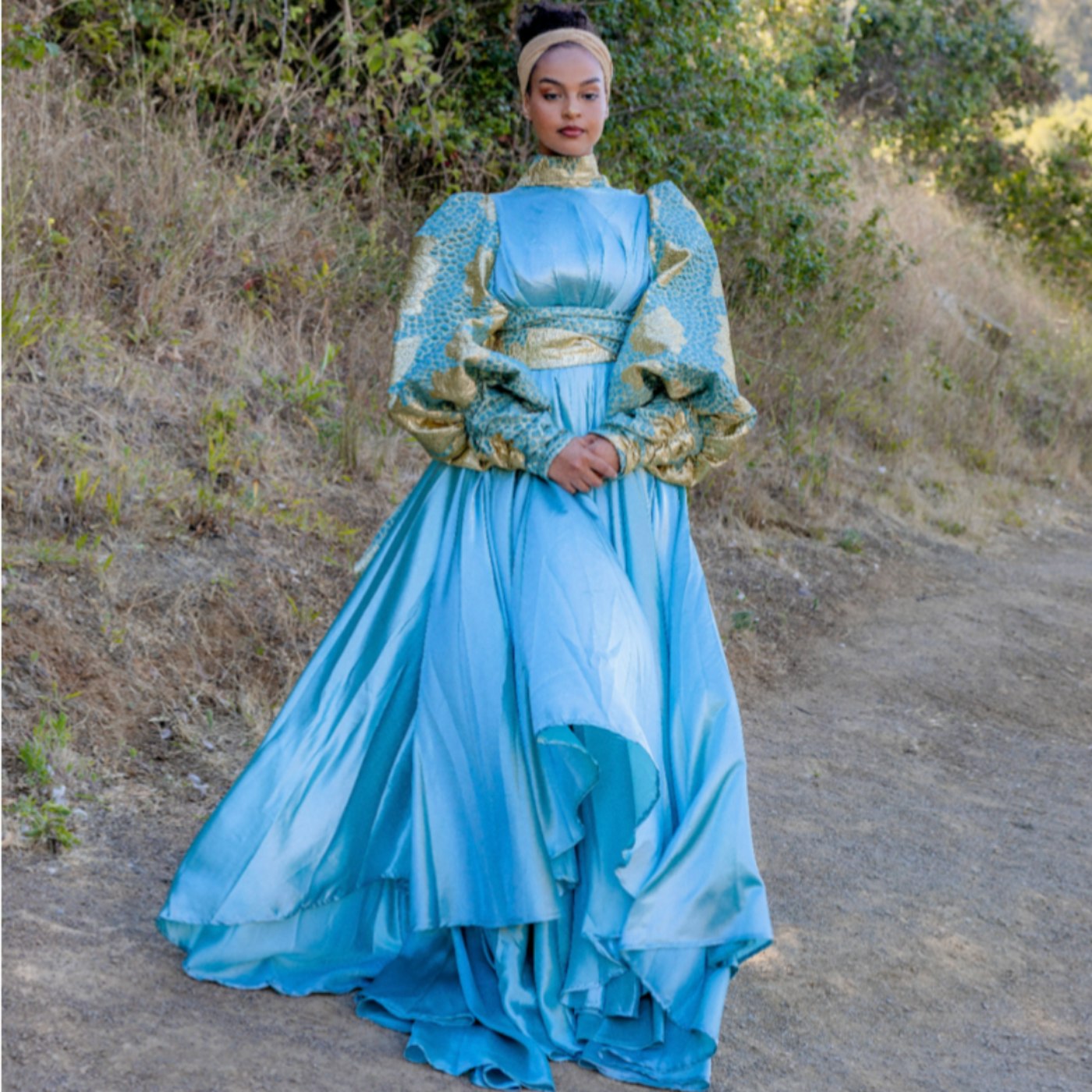
“When I advocate for more accessibility in the Muslim community for individuals with disabilities, some people tell me the world can’t cater to my needs. My response? I don’t expect them to. What I want is for people to find ways to be more inclusive of those with disabilities. And most of all, I want to meet someone who will consider loving me for all that I am –including my disability.” – S.H.
In an effort to make a bigger impact, we teamed up with the Salams app, Friendship, & Networking app. With their help, we provided more analysis on the subject matter, by producing a thirty minute documentary that highlights the women’s stories, and provides insight from Muslim researchers, scholars, matchmakers, and marital therapists. The photo series and documentary aim to offer solace to women who are struggling to get married, while also informing others of the issues in an effort to combat the marriage crisis. We hope our viewers will continue the conversation within their own communities about how to cultivate better values on the way to creating healthy and strong Muslim families. To see all the photos in the series, and watch the Isms Project Documentary, visit: nailahdean.com

Nailah Dean
Tahirah Nailah Dean is a Black American Muslim lawyer, writer, and activist. Her writing focuses on dissecting issues related to the Muslim marriage crisis and has been previously published in Al Jazeera, Insider, and MuslimGirl. She also contributes to other online platforms, with articles penned on navigating long distance relationships, crafting the perfect dating app profile, and how to handle rejection. Her work can be found on her website, at nailahdean.com and on IG @Nailahdean28